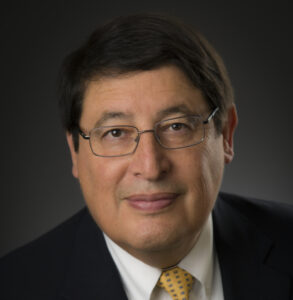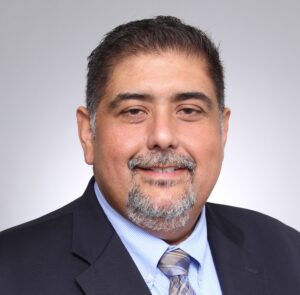Writer: Jerrica DuBois
2 min read January 2022 — In today’s market, access to high-quality, affordable healthcare is a necessity in creating a more equitable community. George Hernandez, president and CEO of University Health System, and Gabe Farias, executive vice president of public affairs and COO of Kellum Physician Partners, spoke with Invest: about their thoughts on the sector’s current challenges, trends and the future of healthcare.
What distinguishes your organization from its competitors?
 George Hernandez: University Health is the only locally owned and operated health system in San Antonio and Bexar County. We take to heart our responsibility to provide outstanding and compassionate care to everyone – those with no health coverage as well as those with commercial health insurance. We are the region’s academic medical center through our partnership with UT Health San Antonio. UT Health physicians practice in our hospital and several of our clinic locations, and together we are at the forefront of new discoveries and training the next generation of healthcare professionals.
George Hernandez: University Health is the only locally owned and operated health system in San Antonio and Bexar County. We take to heart our responsibility to provide outstanding and compassionate care to everyone – those with no health coverage as well as those with commercial health insurance. We are the region’s academic medical center through our partnership with UT Health San Antonio. UT Health physicians practice in our hospital and several of our clinic locations, and together we are at the forefront of new discoveries and training the next generation of healthcare professionals.
 Gabe Farias: When it comes to healthcare, I am of the opinion that more medical services for a region is always better. Our premise is to provide holistic community care from top to bottom. We are a true preventive community practice and committed to patient and community engagement. We are involved in all of our area chambers of commerce. For students in continuing education, we have the capacity to take in and teach them. Our roots are not only in medicine but in teaching and creating opportunities for those working in our clinics. This approach has brought new opportunities for expansion as well. We are going from a 5,000-square-foot building to an 11,000-square-foot office. This doubling in size will be critical as we expand our footprint and patient base.
Gabe Farias: When it comes to healthcare, I am of the opinion that more medical services for a region is always better. Our premise is to provide holistic community care from top to bottom. We are a true preventive community practice and committed to patient and community engagement. We are involved in all of our area chambers of commerce. For students in continuing education, we have the capacity to take in and teach them. Our roots are not only in medicine but in teaching and creating opportunities for those working in our clinics. This approach has brought new opportunities for expansion as well. We are going from a 5,000-square-foot building to an 11,000-square-foot office. This doubling in size will be critical as we expand our footprint and patient base.
How has the labor shortage impacted the healthcare industry?
Hernandez: Hospitals and health systems all across the country are being impacted by shortages of critical staff members such as nurses and respiratory therapists. These shortages are largely driven by the stress of the pandemic, as many baby boomers have made the decision to move up their retirements and other health workers have decided to make career moves to other industries. I am impressed with the outstanding work our nursing leadership and HR team are doing to recruit for these open positions, and to retain long-term employees.
Farias: Our relationships with chambers of commerce have generated connections to area technical schools that have helped us attract new talent. Whether people are new to the field or looking for certifications and training opportunities, having those contacts is critical. The days of just posting an opening online and waiting for applications are over. We need to be aggressive and innovate if we are to meet the demand for labor moving forward.
What are some trends that you see impacting the future of the healthcare industry?
Hernandez: By the end of 2020, we had over 130,000 visits by telemedicine and we don’t see us going back to all in-person visits. There are many visits that must happen in person, but many others can appropriately be conducted on a video call, making it more convenient for patients and also helping us expand access and maximize efficiency. The pandemic also accelerated the creation of our Hospital at Home program. If a patient qualifies, we can offer them the opportunity to receive hospital-level care in the comfort of their home. Nurses and other healthcare professionals visit them every day, and they have routine check-ins with their physicians. We have seen great success in terms of outcomes and patient experience, so we are hopeful this temporary approval will be made permanent.
Farias: Telemedicine has been the root of innovation while also keeping healthcare costs down for patients. It has created more flexibility for patients because they do not need to take time off to make an appointment. That accessibility with our high quality of care is creating more opportunities to take care of their health without taking a chunk out of their bank account. We want to keep our patients from coming to our clinic because we know that preventative care is effective. If we can provide high-end annual checkups and keep people healthy long term without many return visits, we consider that a success.
Our approach to community preventive medicine is always evolving. An example is our Accountable Care Organizations, which is a program designed for seniors to stay healthy and save money. We are also cognizant of people’s pandemic fears delaying their visits. We are working to get more people back out for care and making sure they feel safe in doing so.
For more information, visit:

